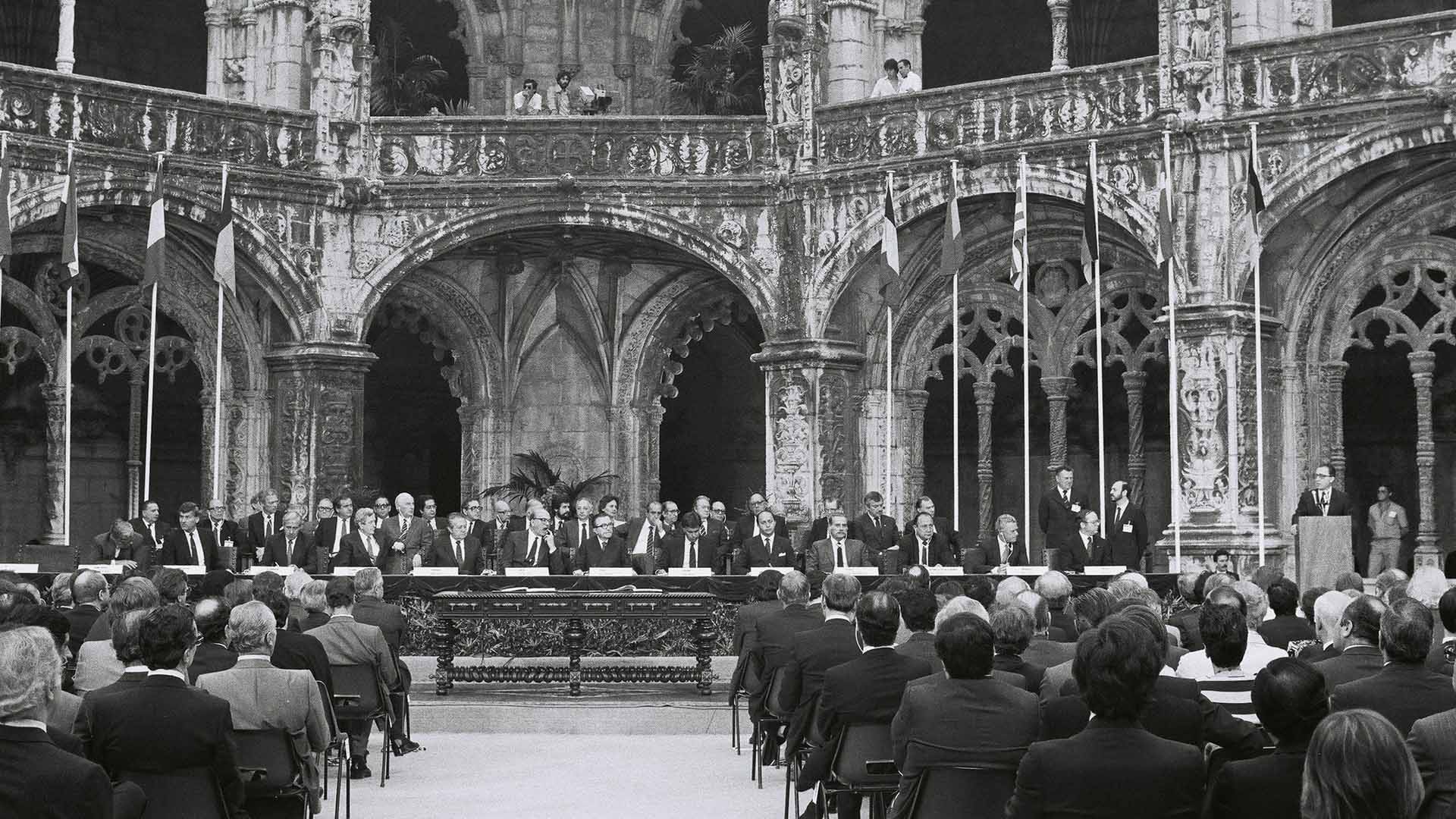Forty years ago this month Spain signed the Treaty of Accession to the EEC, sealing the country’s return to democracy, following the end of the Franco dictatorship, securing its economy in the world’s largest trading bloc and triggering reforms to modernise the economy and infrastructure through billions of euros of funds.
Since 1986, when, along with Portugal, it was incorporated into the EEC, expanding the bloc’s membership to 12 countries, Spain has changed a lot. So has the EEC, which became the EU in 1993 under the 1992 Maastricht Treaty and now embraces 27 nations, 11 of them former communist countries.
The economic benefits of EEC membership were immediately evident. In 1986 the share of total exports going to the EEC rose to 60% from 53% in 1985, while the EEC’s slice of Spain’s import market rose from 36% to 48%.
We will never know what might have happened had Spain not joined the EEC, but the following assumptions are probably fair. Democracy would have been consolidated more slowly, international influence would have been reduced and the economy would have missed out on the benefits of the single market, which guarantees the free movement of goods, services, capital and people within the bloc, and also on access to funds.
Excluded from the customs union, exporters would have faced higher tariffs and trade barriers with their main markets. Spain would also have been excluded from the common agricultural policy (CAP), which has had a significant impact on its agricultural sector. The pace of economic reforms, needed to make the country more competitive and fiscally more disciplined, would have been slower. Lastly, EEC membership helped Socialist Prime Minister Felipe González engineer a U-turn in his NATO policy and win the March 1986 referendum on remaining in the alliance.
The economic benefits of EEC membership were immediately evident. In 1986 the share of total exports going to the EEC rose to 60% from 53% in 1985, while the EEC’s slice of Spain’s import market rose from 36% to 48%. The inward stock of FDI was fairly negligible until 1986 when it took off, as companies sought to position themselves in a consumer market of some 40 million, and reached US$897.3 billion in 2023 (56.7% of GDP), far more than Italy in both relative and absolute terms. GDP growth averaged 3.7% per year between 1986 and 1991. The economy became much more open: exports and imports of goods and services have risen from 35.4% of GDP in 1986 to more than 72%.
In order to ease the wrenching economic adjustments that Spain had to make to meet its EEC obligations and the increased competition, González became the champion of the poorer EEC members –Portugal, Ireland, and Greece– in addition to Spain. At the December 1992 summit in Edinburgh, González won the EEC’s agreement to establish a cohesion fund for countries, like Spain, whose per capita income was less than 90% of the EEC average, and an increase in structural funds for poor regions in order to reduce the income disparities between them.
Spain has benefited considerably from the various types of funds, many of which have been used to help transform the country’s transport infrastructure with the building of motorways, airports and a high-speed railway network. Spain is the third largest beneficiary of cohesion funds (€35.5 billion) for 2021-27 after Poland and Italy.
As the years have gone by, support for the EU has declined in almost all countries but remains high in Spain. More than 75% of respondents say the country benefits from EU membership, according to a Eurobarometer survey earlier this year.
Figure 1. Taking everything into account, would you say your country has on balance benefited or not from EU membership? (% benefited)
| % | |
|---|---|
| Portugal | 91 |
| Netherlands | 85 |
| Poland | 84 |
| Germany | 79 |
| Spain | 76 |
| EU-27 | 74 |
| Italy | 67 |
| France | 65 |
| Bulgaria | 61 |
Spain has been active in the construction of the European project, closely involved, for example, in the negotiation of the treaties of Amsterdam (1997), Nice (2001), the failed Constitutional Treaty (2004) and Lisbon (2009).
EEC membership has undoubtedly spurred growth in Spain’s per capita income to a much greater extent than had it not joined (from US$3,207 in 1986 to US$34,553 in 2024). But relative to the EU average in purchasing power standards (PPS) it fell from a peak of 105% in 2006 to 92% in 2024 (see Figure 2). During that period, the EU expanded enormously (10 countries joined in 2004), as did Spain’s population (+4.6 million).
Figure 2. Per capita GDP in purchasing power standards, EU = 100
| 1986 (1) | 2000 (2) | 2006 (3) | 2013 (4) | 2024 (5) | |
|---|---|---|---|---|---|
| Germany | 120 | 114 | 105 | 118 | 115 |
| France | 109 | 99 | 111 | 98 | 99 |
| Italy | 105 | 98 | 105 | 96 | 98 |
| Spain | 90 | 92 | 105 | 91 | 92 |
| Poland | NA | 79 | 52 | 68 | 79 |
As Spain has become richer, so it has ceased to be a net beneficiary of EU funds. In 2023, the last year for which there is information for each country, Spain was the fourth-largest contributor to the EU budget (€13,585 million), in line with the size of its economy, but after taking into account how much it received, it was a net contributor to the tune of €1,463 million (see Figure 3).
Figure 3. The EU’s net contributors, 2023 (€ million)
| Receipts | Contributions | Net contribution | |
|---|---|---|---|
| Germany | 14,065 | 33,818 | 19,753 |
| France | 16,498 | 25,831 | 9,333 |
| Italy | 12,804 | 18,756 | 5,952 |
| Spain | 12,122 | 13,585 | 1,463 |
| Netherlands | 2,886 | 9,139 | 6,253 |
| Sweden | 2,081 | 3,724 | 1,643 |
| Ireland | 2,264 | 3,536 | 1,272 |
| Austria | 2,167 | 3,488 | 1,321 |
| Denmark | 1,776 | 3,023 | 1,247 |
| Finland | 1,517 | 2,324 | 807 |
Spain is perceived by foreign policy experts as now punching in the EU more in line with its weight than it did 20 years ago, though this concept is impossible to gauge objectively. The economy’s strong recovery from the impact of the COVID pandemic (GDP growth this year and last has far outpaced that of the eurozone as a whole) and the UK’s departure from the EU has enhanced Spain’s position in the bloc. It also helps that Prime Minister Pedro Sánchez is a fluent English speaker and so is able to engage more easily with his counterparts than all his predecessors. Spain was a prime mover behind the creation of the NextGenerationEU (NGEU) programme, launched in 2020 to stimulate economic recovery from the COVID-19 pandemic. It is the second-largest recipient of NGEU funds (€80 billion in non-repayable grants and €83 billion in loans) after Italy.
Sánchez is the EU’s most vociferous critic of Israel’s conduct of the war in Gaza and violations of international law, incurring the wrath of Israel’s Prime Minister, Benjamin Netanyahu. Spain recognised, together with Ireland and Norway, the state of Palestine in 2024 and supported the genocide case against Israel brought by South Africa to the International Court of Justice last year. But Spain finds itself in a minority position compared with other EU states that are more aligned with Israel or less willing to speak out.
Sánchez is also one of Europe’s staunchest supporters of Ukraine’s resistance to Russia’s invasion. His first visit to Kiev was in April 2022, two months after the start of the war with Russia, came before that of his French, German and Italian counterparts.
In defence spending, however, Spain is a laggard. Its expenditure in 2024, at 1.28% of GDP, was not only the lowest among EU countries but the lowest among all 32 NATO members (see Figure 4). Under pressure from the US government, Sánchez has promised to reach NATO’s 2% spending target, set in 2014, this year. Spain had previously said it would only attain it in 2029. That figure, however, has been superseded by US President Donald Trump’s demand, reportedly supported by NATO chief Mark Rutte, for a much higher mark of 5%, which is clearly beyond Spain’s capabilities. The issue will be thrashed out at the NATO summit later this month.
Figure 4. Defence spending, 2014 and 2024 (% of GDP)
| Country | 2014 | 2024 |
|---|---|---|
| Poland | 1.84 | 4.26 |
| US | 3.38 | 3.71 |
| UK | 2.14 | 2.28 |
| Germany | 1.19 | 2.12 |
| France | 1.82 | 2.06 |
| Italy | 1.14 | 1.49 |
| Spain | 0.92 | 1.28 |
The government is also still struggling to convince the EU of the merits of granting Catalan, Basque and Galician official status as EU languages. The postponement is a setback for the government; the official status of Catalan (not of the other two languages) was one of the conditions imposed by the separatist party Junts for providing the seven votes in parliament in November 2023 that enabled Sánchez to become prime minister for a third term. The EU postponed a decision for the second time last month, citing a lack of the required unanimous support among the 27 member states. The European Commission puts the cost of adding the three languages at €132 million per year, which Spain says it will pay.
EU membership has greatly benefited Spain but it can bring problems too.



